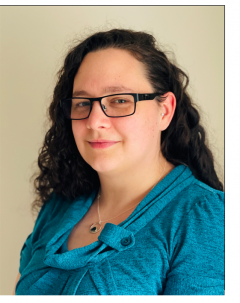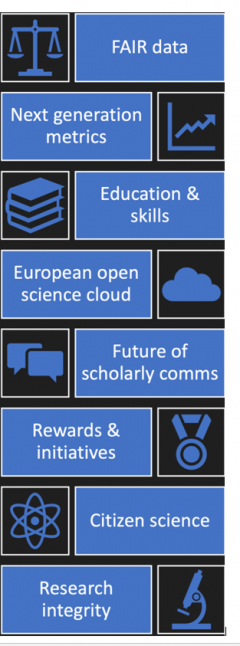Kirsty Wallis, Head of Research Liaison, UCL
Citizen Science is a central part of the work of the UCL Office for Open Science & Scholarship (OOSS).
The OOSS launched in October 2020 and is underpinned by the LERU 8 Pillars of Open Science. It is supported internally by both a steering group and the high-level Open Science committee, which is chaired by the Vice Provost for Research, Innovation & Global Engagement. There are a number of teams that were well established before the foundation of the OOSS, such as the Open Access and Research Data Management teams, and these have been integrated into the office in a ‘dotted-line’ fashion. For these teams the office provides a central point and sets a central voice for the ‘Open’ message, without placing restrictions on well established (and very effective) team dynamics and processes.
The core aims of the office are to collaborate with its stakeholders and set direction and strategy across all of the pillars of Open Science, (diagram, right), identify and advocate for best practice, create and share resources as well as organising events, training, workshops and an annual conference.
On the surface, Citizen Science may not seem an obvious component of Open Science, or the work of libraries but the principles of Citizen Science are intrinsically linked to both. At its core, Open Science encourages collaboration, sharing information and widening participation in research from across society, beyond simply sharing outputs and anyone that thinks libraries are mostly about collections has forgotten the wide range of services that we provide for our communities, whether inside academia or beyond.
Citizen Science is an overarching term that describes a group of methodologies found in different academic disciplines – from the natural sciences to the social sciences and the humanities. Within each discipline, the interpretation of Citizen Science can be slightly different to match the disciplinary practices, but they all have similar characteristics, such as including participants in the research process in a meaningful way.
Harnessing the advantages of the internet, openly available software packages and combining with local knowledge, embracing citizen science can bring about a change in the way research is conducted – one no longer limited to academic researchers, it encourages active collaboration from groups across society, making members of the public fellow researchers.
The work of the office in supporting Citizen Science has been built upon the extensive expertise already evident across the university, with the new service being developed to centralise support and enhance networks that already exist, rather than reinventing the wheel. The team at the office has been working to identify areas of expertise and build both a community between groups from different disciplines who would not normally come together, but also a bank of project examples to serve as a resource for new academics interested on starting their citizen science journey.
Citizen Science activity within the office is also supported by a cross-faculty Citizen Science Working Group (CSWG) including members of the Office for Open Science & Scholarship, UCL’s Institute for Global Prosperity, the ExCites research group and the Co-Production Collective as well as other experts and stakeholders from across the university.
This working group will be responsible for supporting the UCL Citizen Science Academy going forward and its upcoming certificate once it launches. The group, supported by the new Citizen Science Coordinator will be responsible for verifying new programmes and ensuring the consistency of the programme across different cohorts. It will also be instrumental in supporting the citizen science elements of the Office as they develop, including being a part of events and advocacy across UCL for more citizen science projects.
The UCL Citizen Science Academy is an ambitious project which aims to deliver community-based and practice-led research training to empower communities to lead change through social action and shaping policies that impact their local communities or livelihoods. The Citizen Science Academy launched its first programme in September 2021, linked to the IGP’s Prosperity in East London 2021-2031 longitudinal study.
Programmes in the Citizen Science Academy have been designed to make participation in research inclusive and accessible to people from all kinds of backgrounds. The rigorous, high-quality education and training programmes are directly linked to active research projects in local communities, and are delivered in non-academic, community-based settings. Participants do not need any prior experience of research, work or study in further or higher education. The Academy is a major step forward for UCL’s citizen science support, initiatives and commitment to principles of civic education.
The Academy team and the CSWG are developing a Citizen Science certification – this will be a non-academic certification which is scheduled for launch later in 2022. The award will reward academy participants for demonstrating competence in core Citizen Science techniques that they have learned during the programme and give them recognition for the work they have undertaken. The team hopes to grow and develop the programmes and expand in conjunction with local authorities and charity partners.
The work being undertaken at UCL Is not being done in isolation. While there is interest from other institutions in the UK, there are as yet few similar initiatives here. Colleagues in Europe however, already have services like this well-established. For example we are working closely with our friends at the University of Southern Denmark, who were the co-presenters on the Citizen Science paper at the recent UKSG conference. The office at UCL is also an active collaborator in two EU-funded research projects to understand and encourage more institutions to build their own services and education programmes.
Supporting Citizen Science is a natural progression to the work we are all doing to support Open Access and the principles of Open Science. The breadth of topics that fall within the definition of Citizen Science mean that any institution will have at least a small number of projects that can be identified and supported as a first step.
If you are interested in learning more there are numerous training resources on our website, but the LIBER Citizen Science Working Group is at present compiling a Guide to Citizen Science specifically for Research Libraries – the first of four sections is available now.


